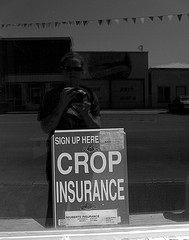I decided to take a few minutes this morning and search on the internet for "Crop Insurance" — a search that virtually every FlashReport reader is sure to never have done before.
 You will see that the there are a ton of headlines in California papers today talking about the negative impact of the really, really cold weather on a lot of California agriculture — especially the citrus crop. There have been local states of emergency declared by cities and counties, and even Governor Schwarzenegger has declared emergencies in many parts of California, opening the doors for President Bush to make similar declarations at the federal level. Of course, these ’emergencies’ are not life or death crisis situations — no American will live or die without their fresh glass of orange juice — these are states of economic emergency. Farmers are losing their crops, their livelihood, and are seeking aid during a very challenging time.
You will see that the there are a ton of headlines in California papers today talking about the negative impact of the really, really cold weather on a lot of California agriculture — especially the citrus crop. There have been local states of emergency declared by cities and counties, and even Governor Schwarzenegger has declared emergencies in many parts of California, opening the doors for President Bush to make similar declarations at the federal level. Of course, these ’emergencies’ are not life or death crisis situations — no American will live or die without their fresh glass of orange juice — these are states of economic emergency. Farmers are losing their crops, their livelihood, and are seeking aid during a very challenging time.
Which brings me back to why I was researching crop insurance on the web. It’s really straight forward — I wanted to know if there was such a thing. I’m a city kid, born and raised on the Westside of Los Angeles — and so I have never spent much time on farms. But if I am a business owner with crops, it seems to me that there has to be a way to plan against this kind of cold weather and its impact on my crops.
You know what I found out in my search? Not only is there a lot of crop insurance out there, but the federal government massively subsidizes crop insurance already (probably due to the effective lobbying of the ‘heartland’ legislators who always seem able to get farming subsidies into the federal budget).
Here is a good statistic courtesy of the USDA’s Risk Management Unit, in California alone, less than 10% of California crops were insured for more than 70% in case of a loss such as we are seeing now. On average, about 60% of California crops have some sort of insurance. Now a lot of crops are more sturdy than citrus, and so it would make sense that if there was less risk of weather or pests damaging or destroying a crop, you would naturally have less need for insurance.
But I would be very interested to know how many California citrus farmers invest in crop insurance. Because it is all fine and dandy to have triple-layers of disasters declared, and clamor that it these unfortunate growers (and they are unfortunate when something like this happens) need government subsidies. But America is also built on the idea of individual, not collective responsibility. Which means that if you make an investment in a business, you need to take out insurance to protect yourself against the unknown. I will not go into detail on the insurance premiums I pay as a small business owner. But they are fairly substantial. But if I should run into a myriad of problems, I have assumed responsibility for my own risks.
**There is more – click the link**

